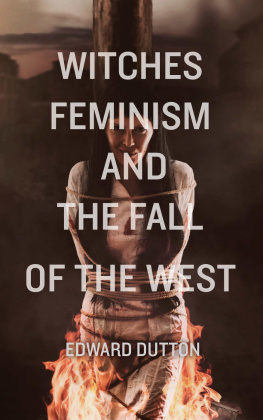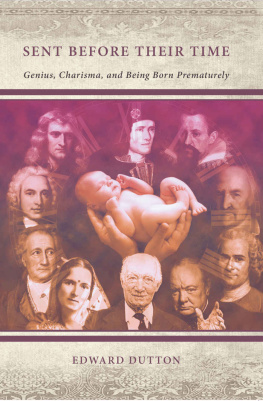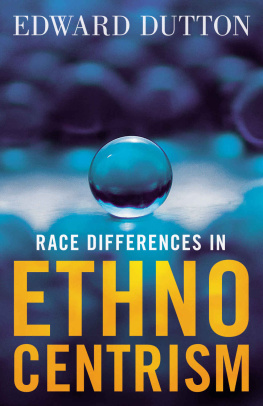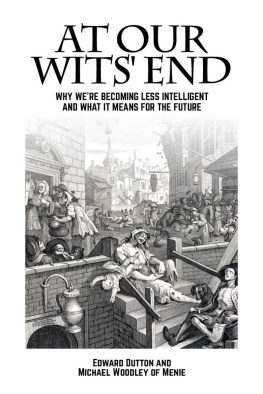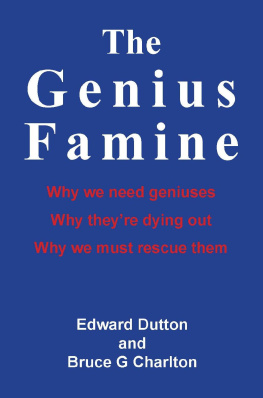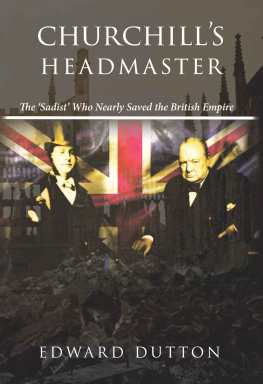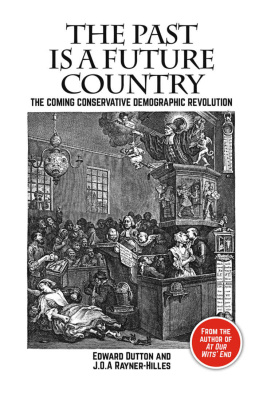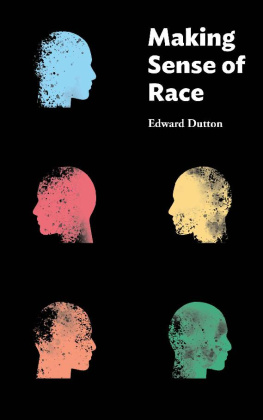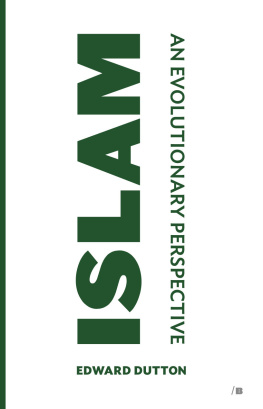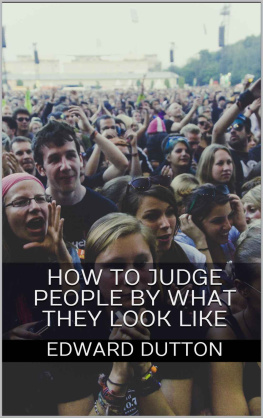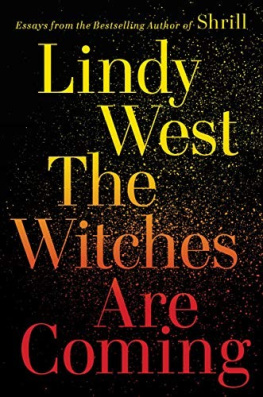Edward Dutton - Witches, Feminism, and the Fall of the West
Here you can read online Edward Dutton - Witches, Feminism, and the Fall of the West full text of the book (entire story) in english for free. Download pdf and epub, get meaning, cover and reviews about this ebook. year: 2021, publisher: Radix, genre: Religion. Description of the work, (preface) as well as reviews are available. Best literature library LitArk.com created for fans of good reading and offers a wide selection of genres:
Romance novel
Science fiction
Adventure
Detective
Science
History
Home and family
Prose
Art
Politics
Computer
Non-fiction
Religion
Business
Children
Humor
Choose a favorite category and find really read worthwhile books. Enjoy immersion in the world of imagination, feel the emotions of the characters or learn something new for yourself, make an fascinating discovery.
- Book:Witches, Feminism, and the Fall of the West
- Author:
- Publisher:Radix
- Genre:
- Year:2021
- Rating:5 / 5
- Favourites:Add to favourites
- Your mark:
- 100
- 1
- 2
- 3
- 4
- 5
Witches, Feminism, and the Fall of the West: summary, description and annotation
We offer to read an annotation, description, summary or preface (depends on what the author of the book "Witches, Feminism, and the Fall of the West" wrote himself). If you haven't found the necessary information about the book — write in the comments, we will try to find it.
Witches, Feminism, and the Fall of the West — read online for free the complete book (whole text) full work
Below is the text of the book, divided by pages. System saving the place of the last page read, allows you to conveniently read the book "Witches, Feminism, and the Fall of the West" online for free, without having to search again every time where you left off. Put a bookmark, and you can go to the page where you finished reading at any time.
Font size:
Interval:
Bookmark:
Edward Dutton
2021 by Edward Dutton
All rights reserved. No part of this publication may be reproduced, distributed, or transmitted in any form or by any means, including photocopying, recording, or other electronic or mechanical methods, or by any information storage and retrieval system, without prior written permission from the publisher, except for brief quotations embodied in critical reviews and certain other non-commercial uses permitted by copyright law. For permission requests, contact the publisher.
Radix & Washington Summit Publishers
P.O. Box 1676
Whitefish, MT 59937
email : hello@WashSummit.com
web: www.WashSummit.com
Cataloging-in-Publication Data is on file with the Library of Congress
hardback : 978-1-59368-078-7
paperback : 978-1-59368-079-4
e Book : 978-1-59368-080-0
audio : 978-1-59368-081-7
Printed in the United States of America
10 9 8 7 6 5 4 3 2 1
I would like to thank Dr. Bruce Charlton for his valuable advice on developing this book and for his many important ideas on its subject matter. I would also like to thank Professor Guy Madison for reading through and commenting on earlier versions of this manuscript. Mr. Richard Spencer, Mr. Nils Wegner, and Ms. CK edited the work and prepared it for press, and Mrs. J. LeDarc designed the cover. Im grateful to all of them.
I was inspired with the idea that modern feminists are the descendants of Early Modern witches by a comment by the Internet content creator Mrs. Robyn Riley. I would like to thank her for her thought-provoking interviews. I would like to thank all of my followers on my Internet channel, The Jolly Heretic , for their stimulating suggestions and, in particular, John Oliver Allen Rayner-Hilles, Esq. I would also like to thank Professor Ray Blanchard who gave me a very helpful interview.
This book mainly developed out of an earlier project entitled The Taming of the Gene which was funded by the Ulster Institute for Social Research, I wish to thank them for their financial support. The development of the ideas herein has benefited from discussions with Dr Michael Woodley of Menie, so I would like to acknowledge my intellectual debt to him. Parts of this book have previously appeared in: At Our Wits End by myself and Michael Woodley of Menie and in my books How to Judge People By What They Look Like, The Silent Rape Epidemic; The Victorian Spinster and the Rise of Feminism in Family Tree (July 2013), and Edward Dutton and J.O.A. Rayner-Hilles (In Press), Early Modern Witches and Demonic Sexual Fantasies: An Evolutionary Perspective in Mankind Quarterly.
Edward Dutton
April 25th, 2021
Oulu, Finland
Witchcraft, and Witches, have been, and are, the former part is clearly proved by the Scriptures, and the last by daily experience...
King James VI of Scotland
Demonology , 1597.
Introduction
We begin with a folktale. Once upon a time , there were peoples known as the Europeans. We inhabited a world that was cold and harsh, and our various bands battled for survival and dominance. The groups that won out were the best suited to the struggle: bonded to one another and hostile towards outsiders. We were spirited, fertile, and hardy, as this was Gods will. Soundness of body and soundness of mind went together. We lived lives of toil, even tragedy, but we reached the pinnacle of health, intelligence, and organization. We spun a connecting thread between ancestor and offspring.
Sometimes, though, the witches would come around. When they did, they were persecuted with a vengeance. The witches poisoned everything they touched. They formed communities apart. They disobeyed God with their spells, magic healing, and lives away from men. These women bore marks that announced them as unholy. A persons face can tell you quite a bit about her soul: Monstrum in fronte, monstrum in animo . Witches were at the bottom of society because that is where they belonged. Upright people rose to the top.
The Industrial Revolution, with all its marvels, changed everything. In 1800, half of all those born died as children; two centuries later, almost none did. More and more people who would not have survived in the old times walked among us. They were mistakes made flesh. They no longer uplifted the established rules; they endlessly criticized and undermined them, like the witches of yore. Unwell in body and mind, they were, at best, selfish and impulsive; at worst, they promoted depression and despair.
Some of these villains were born into societys highest ranks, or rose there due to their cleverness. The really spiteful ones advocated for ideas that were catastrophic. Worse still, people listened to them, since most are born to obey. The nature of our communities changed, including our outposts and colonies around the world. We all went mad, you could sayeveryone, except those who were naturally resistant or too slow to conform. Deviancy became the norm; patriarchy was overturned. Those who were brightest were the first to accept the new religion, as they could talk themselves into anything. They even talked themselves into having small families or no children at all.
These new witches lived out in the open and were even celebrated. So many women were taken in by their spells: they behaved like men; they cared about careers more than children; they raised boys as girls. Even men listened to the witches. Our societies were feminized, though that didnt mean they became kinder and gentler. The persecuted became the persecutors, the judged became judges, the last came first. Everything was out of joint.
These are dizzying times... but nothing lasts forever. Those susceptible to the witches spells are cursed with barrenness; those who are religious still multiply. We Europeans thus stand at a fork in the road. Some say that the children will bring about a revival of the old ways, though in a population that is much dimmer than in previous times. Some see a civil war or breakdown over the horizon. Others warn of a return to the harsh conditions of the past. Whichever way destiny takes us, the witches, and those under their spell, are not long for this world.
u
This book, Im afraid, wont answer the question of whether we will live happilyor unhappilyever after. That will be the subject of future writing. But it is an attempt to tell a story about European evolution, how it was affected by religion, climate change, and the industrial revolution. In particular, its a story of how the figure of the witch fits in to all thishow she went from being persecuted and despised to acting as a leader and bad conscience of postmodern society. In both cases, witches were not the stuff of nightmare or fantasy; they were all too real . And they impacted people and society in ways that have previously been misunderstood.
The Wicked Witch
The
Western adults do not generally believe in witches anymore. But the historical significance of witches is attested to by the way in which adults pass on the folk memory of them to their children through fairytales: Hansel and Gretel, Sleeping Beauty , Snow White , and many more. This is significant, because fairytales are more than just interesting bedtime stories. Evolutionary psychologists, those who study the evolution of the human mind, generally agree with American evolution-focused literary scholar Joseph Also, these stories have been vetted across generations to be maximally informative and engaging, meaning they are likely to be very useful guides to life, including guides to how to deal with strangers. And this raises the question of what kinds of strangers, in particular, you should avoid. Fairy tales consistently provide children with the answer: Witches.
Font size:
Interval:
Bookmark:
Similar books «Witches, Feminism, and the Fall of the West»
Look at similar books to Witches, Feminism, and the Fall of the West. We have selected literature similar in name and meaning in the hope of providing readers with more options to find new, interesting, not yet read works.
Discussion, reviews of the book Witches, Feminism, and the Fall of the West and just readers' own opinions. Leave your comments, write what you think about the work, its meaning or the main characters. Specify what exactly you liked and what you didn't like, and why you think so.

